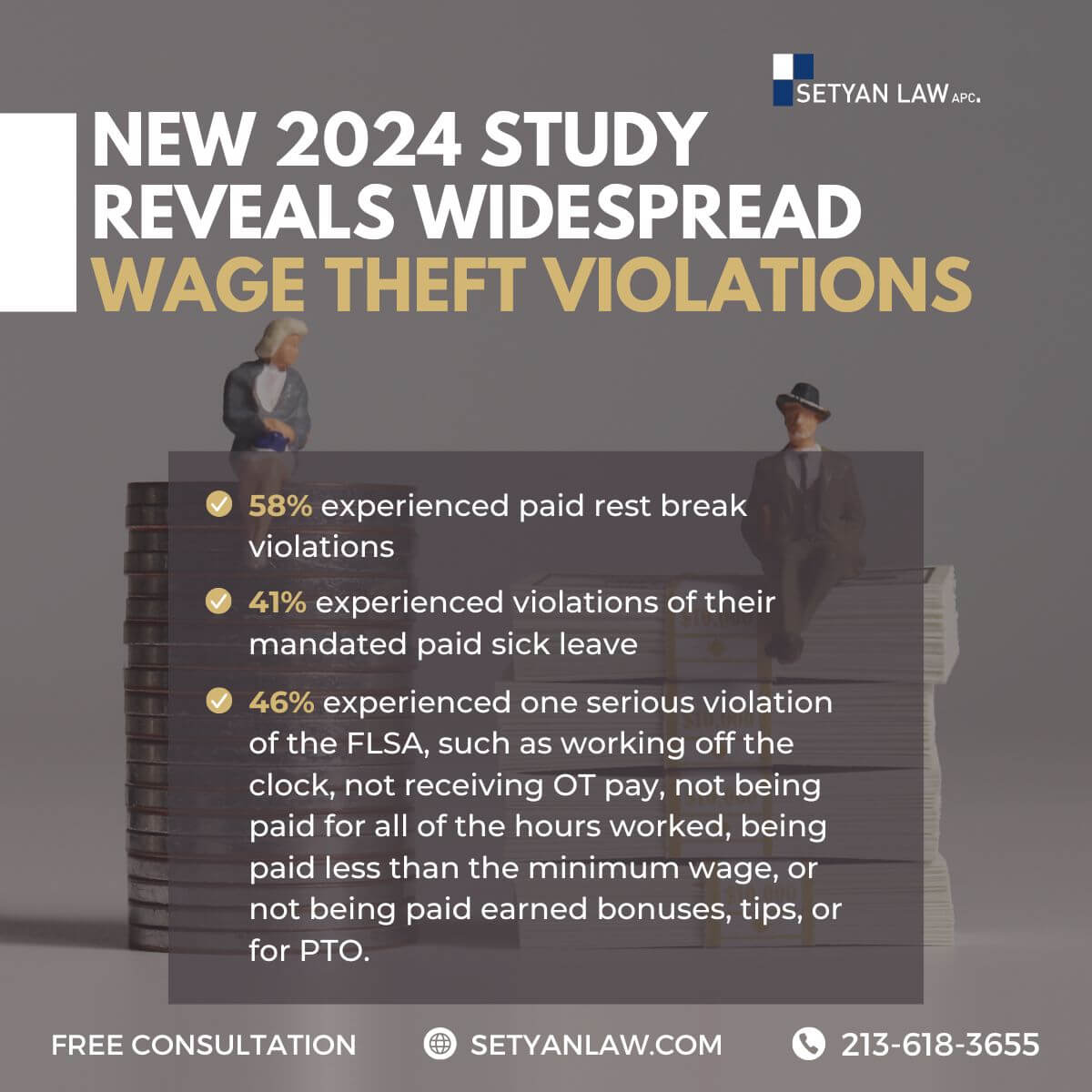Updated October 13, 2025
How to Calculate California Waiting Time Penalties: Get What You're Owed
Did your California employer fail to pay your final wages on time? California waiting time penalties could entitle you to up to 30 days of additional pay.
Unfortunately, many California workers walk away from their jobs without knowing they're leaving money on the table. When employers delay final paychecks—whether by a few days or several weeks—they violate state labor laws designed to protect workers.
In fact, these penalties can add up quickly. If you earned $20 per hour working full-time, you could be owed up to $4,800 in waiting time penalties alone—regardless of how much your employer actually owes you in unpaid wages.
California law strictly regulates when final paychecks must be delivered. If your employer missed these deadlines, they may owe you significant compensation beyond your regular wages.
This guide will show you exactly how to calculate California waiting time penalties, determine if you qualify, and take the right steps to recover what you're legally owed. Let's make sure you get every dollar you deserve.
Understanding California Waiting Time Penalties
California's labor laws strongly protect employees who don't receive their final paychecks on time. These protections come in the form of specific penalties that can significantly increase what employers owe to departing workers.
What is a waiting time penalty?
A waiting time penalty is a financial consequence imposed on employers who fail to provide timely payment of final wages to employees who quit or are terminated. These penalties apply to all types of employees—full-time, part-time, temporary, probationary, exempt, and non-exempt workers alike .
The penalty equals the employee's daily wage rate multiplied by the number of days the final payment is delayed, up to a maximum of 30 calendar days . Importantly, these 30 days include all calendar days (including weekends and holidays), not just workdays .
For example, if you earn $25 per hour for an 8-hour workday, your daily rate is $200. If your employer delays your final paycheck by two weeks, you could be entitled to $2,800 in waiting time penalties ($200 × 14 days) .
Furthermore, the penalty applies even if just $1 in final wages remains unpaid . Once calculated, waiting time penalties are not considered wages—meaning no deductions are taken from the penalty payment .
Which labor codes apply?
California's waiting time penalties are primarily governed by three sections of the Labor Code:
- Section 201: Requires immediate payment of all wages upon termination
- Section 202: Mandates payment within 72 hours for employees who quit without notice, or on the last day for those giving at least 72 hours' notice
- Section 203: Establishes the waiting time penalty itself and outlines how it's calculated
Under these sections, "wages" encompass all compensation due, including regular pay, overtime, accrued vacation time, and calculable commissions or bonuses . However, expense reimbursements are not included in this definition .
The penalty only applies to "willful" failures to pay. Notably, "willful" in this context simply means non-accidental—not malicious intent . Courts have even ruled that passive inaction, such as failing to calculate vacation time, can be considered willful .
Why these penalties exist
These penalties serve a crucial purpose in California's employment landscape. The state has long favored prompt and complete payment of wages owed to workers . Labor Code Section 203 was specifically enacted to ensure employers comply with laws governing final wage payments .
The waiting time penalty functions as both a deterrent and compensation mechanism. It discourages employers from deliberately withholding final payments or delaying them unnecessarily . Additionally, it compensates workers for the hardship of waiting for earned wages after employment ends.
Beyond protecting individual workers, these penalties help maintain overall labor standards. Without these strict requirements, unscrupulous employers might regularly delay final paychecks to improve cash flow at employees' expense.
The law recognizes only limited exceptions. A "good faith dispute" about the amount owed may prevent penalties, but this requires a legally supportable defense . Moreover, an employer must still pay any undisputed amounts on time—failing to do so defeats the "good faith" defense .
When Are Final Wages Legally Due?
Knowing precisely when your final wages are legally due forms the cornerstone of understanding California waiting time penalties. The California Labor Code establishes strict timelines that vary depending on how your employment ends.
If you're fired
The law provides immediate protection for terminated employees. When an employer fires or lays off an employee in California, final wages must be paid immediately at the time of termination . This requirement is strictly enforced—even a one-day delay constitutes a violation .
Consider this crucial detail: if you're terminated, your employer must provide your complete final paycheck right then and there, at the location where the termination occurs . This includes all earned and unpaid wages up to your last day of work .
If you quit with notice
California law creates a distinction based on how much notice you provide when resigning. If you give your employer at least 72 hours of notice before quitting, your final wages become due on your last day of work .
Essentially, providing sufficient notice entitles you to walk out on your final day with your complete paycheck in hand. The employer must make your payment available "at the office or agency of the employer in the county where the employee has been performing labor" .
If you quit without notice
When you resign without providing at least 72 hours' notice, your employer has 72 hours from the moment you quit to provide your final wages . During this period, you have options for receiving payment.
You may designate a mailing address to receive your final paycheck . Importantly, when mailed, the payment is considered made on the date the employer mails the check—not when you receive it . Alternatively, you can collect your final wages in person at your employer's office in the county where you worked .
Special rules for certain industries
California recognizes that certain industries have unique operational challenges, necessitating modified timeframes:
Seasonal agricultural workers: When laid off as a group at season's end, employers have 72 hours to provide final paychecks .
Motion picture industry employees: Workers hired for projects with specified durations or on a "call" basis receive their final pay by the next regular payday after employment ends .
Oil drilling industry: Employees fired or laid off must receive final wages within 24 hours, excluding weekends and holidays . This accommodation recognizes that drilling operations often occur far from company headquarters, making immediate calculation and payment challenging.
Live theatrical or concert venues: Employees working at these venues who are routinely dispatched through hiring halls established under collective bargaining agreements may have different time limits for final pay as specified in their agreements .
Temporary services industry: Employers must provide final paychecks no later than the end of the following business day after the employee's last workday .
Failing to adhere to these timelines triggers waiting time penalties, which accrue for each day the employer intentionally delays payment, up to a maximum of 30 days . Understanding these deadlines provides the foundation for determining whether you're entitled to substantial additional compensation beyond your unpaid wages.
How to Calculate Waiting Time Penalties
Calculating California waiting time penalties might seem complicated at first, but the process breaks down into three straightforward steps. Once you understand the formula, you'll be able to determine exactly what your employer owes you.
Step 1: Determine your daily wage
Your daily wage forms the foundation of the waiting time penalty calculation. To determine this amount:
For hourly employees: Multiply your hourly wage by the number of hours you typically work in a day. For instance, if you earn $15 per hour working 8-hour days, your daily wage equals $120 .
For salaried employees: Take your monthly salary, multiply by 12 (months), divide by 52 (weeks), then divide by your typical workdays per week (usually 5) .
For commissioned employees: Calculate your average daily earnings based on your regular commission payments. Add your base salary (if any) to your average monthly commissions, multiply by 12, divide by 52, then divide by workdays per week .
Remember to include regularly scheduled overtime in your calculations. For example, if you consistently work 9 hours daily at $10 hourly, include the overtime hour at 1.5× rate ($15) in your daily rate .
Step 2: Count the number of late days
Count every calendar day between when your final wages were legally due and when they were actually paid. This includes:
- All weekends and holidays
- Every day of delay, regardless of your normal work schedule
- The first day (when payment was due) through the day payment was made
Consequently, if your employer was required to pay you on Friday but didn't pay until the following Wednesday, that counts as 5 days of penalties.
Step 3: Multiply and apply the 30-day cap
Multiply your daily wage by the number of days your payment was late. This calculation is subject to a maximum of 30 calendar days . The formula is:
Daily wage × Days late (up to 30) = Waiting time penalty
Importantly, the law imposes a strict 30-day limit on these penalties, even if your employer takes longer to pay you .
Example calculation
Consider this scenario: You're terminated from your job where you earned $20 per hour working 8-hour days. Your employer doesn't pay your final wages until 15 days after your termination.
- Daily wage: $20 × 8 hours = $160 per day
- Days late: 15 calendar days
- Penalty calculation: $160 × 15 days = $2,400 in waiting time penalties
Had your employer delayed payment for 45 days instead, your penalty would still be capped at 30 days: $160 × 30 = $4,800 .
Initially, these penalties might seem steep. Nevertheless, they serve an important purpose—incentivizing employers to pay final wages promptly while compensating employees for the hardship of waiting for money they've already earned.
What Counts as a Violation?
Several employer actions can trigger California waiting time penalties. Understanding the specific violations helps employees determine if they're entitled to additional compensation.
Late or missing final paycheck
The most straightforward violation occurs when employers fail to provide final wages by the legally required deadline. California law considers a final paycheck late even if it's delayed by just one day . This applies regardless of the reason for separation—whether you were terminated or resigned with or without notice.
Consider this important detail: a final paycheck must include all owed compensation, not just regular wages. Employers violate the law when they use excuses like "payroll needs more processing time" or suggest waiting until the next regular payday .
Partial payments or underpayment
Partial payment constitutes a violation on par with no payment at all. When an employer pays only a portion of what's owed on the due date, waiting time penalties may still apply . This holds true even if the employer pays most of the amount due but withholds a small portion.
Similarly, employers cannot legally withhold final wages because an employee hasn't returned equipment or uniforms . Any deductions not legally authorized constitute a violation that can trigger penalties.
Delays in overtime or commission pay
California treats all forms of earned compensation as wages subject to prompt payment requirements. This includes:
- Overtime pay
- Accrued vacation time
- Earned commissions and bonuses (if calculable at termination)
Importantly, commissions are classified as wages under California law, meaning they must be included in final payment . If calculable at the time of separation, any delay in paying commissions can trigger waiting time penalties just like regular wages.
Willful vs accidental violations
The law distinguishes between willful and accidental violations. Under Labor Code Section 203, penalties apply only to "willful" failures to pay .
Contrary to common assumption, "willful" doesn't require malicious intent or deliberate wrongdoing. Rather, it simply means the employer intentionally failed to pay wages when due . Even passive inaction—such as failing to calculate vacation time—can qualify as willful .
A "good faith dispute" provides the primary defense against willful classification. This occurs when an employer presents a legitimate legal or factual defense that would, if successful, preclude liability . Merely claiming ignorance of the law does not constitute a good faith dispute and offers no protection from penalties .
What to Do If You’re Owed Penalties
Recovering California waiting time penalties requires strategic action and proper documentation. When faced with an employer's failure to pay final wages on time, follow these steps to claim what you're legally owed.
Contact your employer first
First and foremost, notify your employer in writing about the late payment issue. Send a formal demand letter specifying the exact amount owed, including both unpaid wages and potential waiting time penalties. This communication creates a paper trail and gives your employer an opportunity to correct the error without further action.
Keep your tone professional yet firm. Include specific dates of employment termination and when final payment was due versus when it was received (if at all). Set a reasonable deadline for response—typically 10-14 days.
File a wage claim with the Labor Commissioner
Should your employer refuse to pay, file a wage claim with California's Labor Commissioner's Office (also known as the Division of Labor Standards Enforcement or DLSE). This administrative procedure costs nothing and doesn't require an attorney.
Be mindful of the three-year statute of limitations for filing waiting time penalty claims. The DLSE will schedule a conference with both parties to attempt resolution. If unsuccessful, a formal hearing follows where an administrative law judge will decide your case.
Consider a lawsuit or PAGA claim
Although administrative claims are common, filing a lawsuit in court presents another option, especially for complex cases. You might also pursue a Private Attorneys General Act (PAGA) claim, which allows you to sue on behalf of yourself and other similarly affected employees.
Court actions typically require legal representation but may result in additional remedies including attorney fees. Weigh these options carefully based on your circumstances and the amount at stake.
What evidence you'll need
Collect and preserve all documentation supporting your claim:
- Employment records (offer letters, contracts)
- Final pay stubs and wage statements
- Termination notices or resignation letters
- Communication about final pay
- Witness statements if applicable
- Records showing when final payment was actually made
- Calculations of your daily wage rate
Organize this evidence chronologically to create a clear timeline demonstrating when payment was due versus when it was received.
Conclusion
California waiting time penalties serve as powerful protection for workers who don't receive their final paychecks on time. Throughout this guide, we've examined how these penalties work, when they apply, and how they're calculated. Most importantly, you now understand that these penalties can add up to 30 days of additional pay—a significant amount that many employees unknowingly leave behind.
Your rights as a California worker remain clear. Final paychecks must be delivered immediately upon termination, on the last day when quitting with notice, or within 72 hours when quitting without notice. Any delay beyond these deadlines entitles you to compensation at your daily rate for each calendar day of delay, up to the 30-day maximum.
The calculation process follows a straightforward formula: daily wage × days late. Therefore, even seemingly minor delays can result in substantial penalties. A worker earning $20 hourly on an 8-hour schedule could receive up to $4,800 for the full 30-day penalty period.
Employers might attempt to justify delays or partial payments, but the law generally favors employees in these situations. Accordingly, "willful" simply means non-accidental—not malicious intent. This interpretation significantly strengthens worker protections under California labor law.
Should you face a situation where your final wages arrive late, take action promptly. First, contact your employer with a formal request. Subsequently, if necessary, file a wage claim with California's Labor Commissioner or consider legal action. Remember to gather all relevant documentation to support your case.
The penalties exist for good reason—to ensure employers respect labor laws and employees receive timely payment for their work. Understanding these rights empowers you to claim what you've legally earned. After all, those waiting time penalties represent compensation you deserve for the financial hardship caused by delayed wages.
References
[1] – https://www.dir.ca.gov/dlse/faq_paydays.htm
[2] – https://www.melmedlaw.com/guide/final-paycheck-law/
[3] – https://mjbfirm.com/waiting-time-penalties-california/
[4] – https://www.dir.ca.gov/t8/13520.html
[5] – https://calljustice.com/california-final-paycheck-law/
[6] – https://legalaidatwork.org/factsheet/quitting-your-job/
[7] – https://www.shouselaw.com/ca/labor/labor-code-203/
[8] – https://nosratilaw.com/blog/california-final-paycheck-law/
[9] – https://www.calaborlaw.com/california-waiting-time-penalty-calculator/
[10] – https://www.dir.ca.gov/dlse/faq_waitingtimepenalty.htm
[11] – https://www.tomorrowlaw.com/late-paycheck-violations-california/
[12] – https://www.dir.ca.gov/dlse/Late-Payment-of-Wages.htm
[13] – https://bmcclaw.com/faqs/employmentlaw/unpaid-wage-overtime-and-commissions/can-i-take-legal-action-against-my-employer-for-unpaid-commissions/
Call Setyan Law at (213)-618-3655 to schedule a free consultation.






